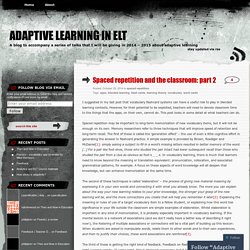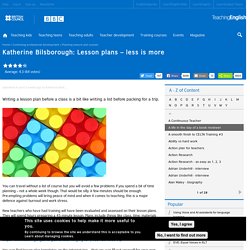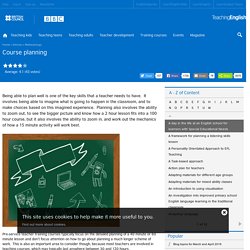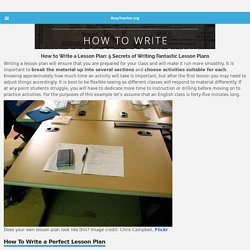

Page from Understanding Language - University of Southampton. Developing Knowledge Questions. TeachingEnglish. Willy Cardoso: Classroom based teacher development. About the webinar Recorded in 2013, this webinar with Willy Cardoso looked at several aspects of classroom-based teacher development: Approaches to teacher development that start from inside the classroom How to involve learners in our development Self- and peer-observation tools How to increase the validity (and currency) of our classroom-based knowledge Critical teacher development (or ‘beware of TEFL slogans’) About the speaker Willy Cardoso has taught English for 12 years in Brazil, UK and Spain, written hundreds of articles on language education in his blog Authentic Teaching, and recently co-authored Real Communication: Culture Reading (Macmillan China).

An aficionado of complexity thinking, philosophy, and critical methodologies in education, Willy has tried to bridge the gap between theory and practice to promote self-directed teacher development. Watch a recording of the webinar below. Reflective teaching: Exploring our own classroom practice. By collecting information about what goes on in our classroom, and by analysing and evaluating this information, we identify and explore our own practices and underlying beliefs.
This may then lead to changes and improvements in our teaching. Reflective teaching is therefore a means of professional development which begins in our classroom. Why it is importantBeginning the process of reflection Teacher diary Peer observation Recording lessons Student feedback What to do next Think Talk Read Ask Conclusion Why it is important Many teachers already think about their teaching and talk to colleagues about it too. You might think or tell someone that "My lesson went well" or "My students didn't seem to understand" or "My students were so badly behaved today. " However, without more time spent focussing on or discussing what has happened, we may tend to jump to conclusions about why things are happening.
The first step is to gather information about what happens in the class. What are you doing? Spaced repetition and the classroom: part 2. I suggested in my last post that vocabulary flashcard systems can have a useful role to play in blended learning contexts.

However, for their potential to be exploited, teachers will need to devote classroom time to the things that the apps, on their own, cannot do. This post looks in some detail at what teachers can do. Spaced repetition may be important to long-term memorization of new vocabulary items, but it will not be enough on its own. Memory researchers refer to three techniques that will improve speed of retention and long-term recall. The first of these is called the ‘generation effect’ – the use of even a little cognitive effort in generating the answer in flashcard practice. The second of these techniques is called ‘elaboration’ – the process of giving new material meaning by expressing it in your own words and connecting it with what you already know.
The third of these is getting the right kind of feedback. Preparation activities Practice activities [2] ibid p.5 Like this: Natural%20approach%20teoria%20krashe.pdf. ALMAXXI13. 10 - Krashen. INSEGNARE CON I TASK. Katherine Bilsborough: Lesson plans – less is more. You can travel without a list of course but you will avoid a few problems if you spend a bit of time planning – not a whole week though.

That would be silly. A few minutes should be enough. Pre-empting problems will bring peace of mind and when it comes to teaching, this is a major defence against burnout and work stress. New teachers who have had training will have been evaluated and assessed on their lesson plans. They will spend hours preparing a 45-minute lesson. You can find lesson plan templates on the Internet too – that you can fill out yourself for your own classes. More experienced teachers tend to spend less time on lesson planning. But what the wise teachers have in common - whether they are new or more experienced - is that they understand the importance of lesson planning but are 100% practical in their approach. Course planning. Pre-service teacher training courses typically focus on the detailed planning of a 40 minute or 60 minute lesson and don’t focus attention on how to go about planning a much longer scheme of work.

This is also an important area to consider though, because most teachers are involved in teaching courses, which may typically last anywhere between 30 and 120 hours. The aim of this article is to share some of the conclusions of a recent project I was part of, with the hope that it might enable other teachers to plan a little faster too! Why do we plan our lessons? I think that most teachers plan lessons in order to feel more confident in the class itself. If we know what we’re trying to achieve in the lesson, we are freed up to spend more time with the learners rather than worrying about our next step. BusyTeacher.org Mobile. Writing a lesson plan will ensure that you are prepared for your class and will make it run more smoothly.

It is important to break the material up into several sections and choose activities suitable for each. Knowing approximately how much time an activity will take is important, but after the first lesson you may need to adjust things accordingly.